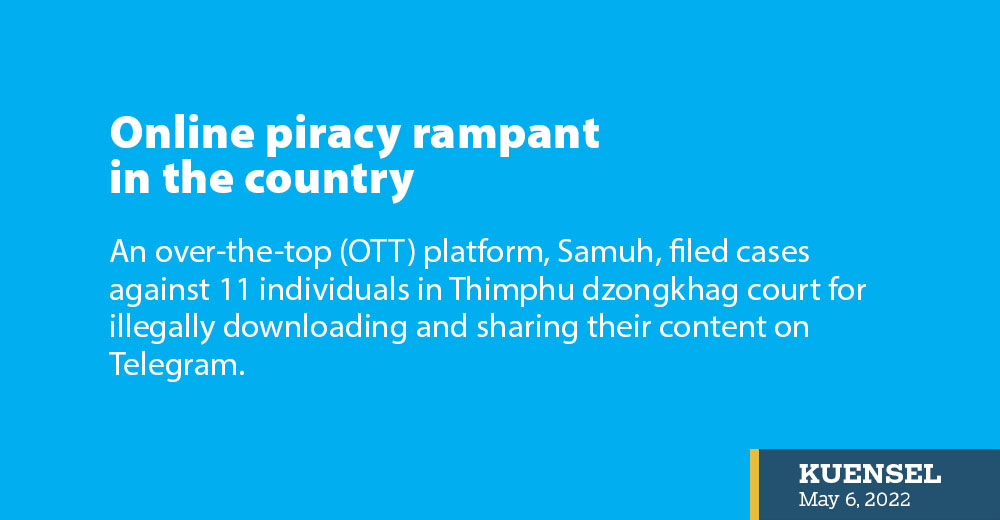… impacting businesses of OTT platform
Chhimi Dema
An over-the-top (OTT) platform, Samuh, filed cases against 11 individuals in Thimphu dzongkhag court for illegally recording and sharing their content on Telegram.
Samuh’s creative director, Kinley Tshering, said Telegram groups were created solely for sharing local audio-visual content.
“This impacts licensed businesses,” he said. “Sharing content by violating intellectual property (IP) rights is a rampant culture. I don’t know if people are not aware of copyright laws or they disregard it.”
Samuh has installed multi-layered featured security called Digital Rights Management to stop piracy issues.
Kinley Tshering said that besides awareness and advocacy, law enforcement agencies should come on board to protect digital consumers and businesses. “The government has to intervene to stop piracy.”
He said that law enforcement agencies such as the police can have a huge impact on discouraging people from sharing local content online.
The Copyright Act of Kingdom of Bhutan 2001 protects the rights of literary and artistic works that include writings, oral works, stage productions, and audio-visual works, among others.
The Act states that the infringer shall be liable for damages for the prejudices suffered and expenses caused by infringement, including legal costs.
“Any infringement of a right protected under this Act, if committed wilfully, or by gross negligence, and for profit-making purposes, shall be punishable by imprisonment for a period of up to one year, or by a fine of up to Nu 1,000,000, or by both.”
In January this year, three violators together had to pay a total of Nu 590,000 to Samuh for damages for the prejudices suffered and expenses caused by copyright infringement, including legal costs.
Two feature films of Songyala, another OTT platform, were shared on a Telegram group.
Chief executive director of Songyala, Sonam Ugyen, said piracy issue is a grave concern for the entertainment industry.
“Contents are shared online disregarding the investment made by producers. This doesn’t adequately reward the artists and discourages the upcoming artists, which hamper the development of the whole industry,” he said.
He claimed that after the content is pirated, film producers’ psychological wellbeing is threatened and the companies face irrecoverable losses. “Producers are discouraged to use the platform considering the piracy risk and this hampers OTT platform business.”
According to Sonam Ugyen, awareness is not the solution. “People are informed about the IP rights but they know no one takes action against them.”
The two OTT platforms employ more than 200 people a year.
Sonam Ugyen said that the entertainment industry has huge potential of generating employment and revenue, and promoting culture. “But piracy should stop and it should be considered a serious offence.”


